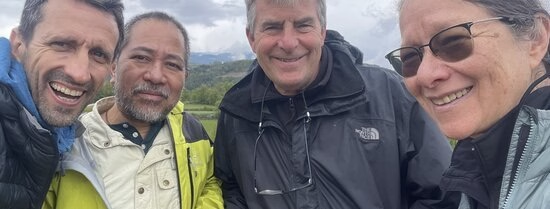Professors Jun Borras (International Institute of Social Studies-EUR), Esteve Corbera (Institute of Environmental Science and Technology, ICTA-UAB), Ian Scoones (Institute of Development Studies) and Anna Tsing (Aarhus University) have been awarded an €8.33 million European Research Council (ERC) Synergy Grant for their five-year project, Land and Life in the Anthropocene: Landscape reform (LAND).
The project asks a pressing question: How can we live on Earth in new ways?
The innovation of the project is to move from land reform to landscape reform, that is, liveable and justice-based transformations for more-than-human life. LAND starts from the recognition that economies, politics, social and natural worlds are deeply interconnected.
'LAND is an excellent proposal for research that addresses some of the most pressing scientific challenges of the time'
Evaluation report ERC-Synergy panel
Examining four layers
Working across four diverse landscapes – the Colombian Amazon, southern African savannas, Mediterranean plains and coastal Southeast Asia – the LAND researchers will explore how land, livelihoods and ecosystems can be reshaped to support both people and the planet.

At its core, LAND connects four intersecting layers: Planet, Profit, Property and Partners. These '4 Ps' reveal how global systems of power, production and profit influence whether and how more just, sustainable landscapes can emerge. Through the lens of ‘landscape reform’, LAND aims to inspire new thinking and action for living on earth in new ways.
Innovative framework
Only when humans, land and nature are deeply connected can true transformations emerge. The 4Ps framework decentres the classic Western separation between humans, land and nature, while at the same time pushing back against relying solely on a top-down 'planetary' perspective. Through engaged public action the project aims for approaches that are inclusive, grounded and shaped by the realities of people and places.
Researchers sharing a common goal
Conceived during a hike in the Spanish Pyrenees, LAND brings together four leading social scientists who combine ethnography, livelihoods research, action research and systems analysis.
The ERC-Synergy panel praised the researchers' exceptional complementarity and proven track records, noting that the team has extensive research networks and established relationships within the project’s study sites.
'The panel recognised the academic strength, complementarity, and proven track record of the [researchers], who bring together a remarkable assembly of expertise across anthropology, political ecology, agrarian studies/development studies, climate research, and multispecies studies', the evaluation report of the ERC-Synergy panel states.
About the Principal Investigators

Jun Borras is Professor of Agrarian Studies at the International Institute of Social Studies (ISS) of Erasmus University Rotterdam (EUR), part of the Erasmus Professors Program at EUR, an associate of the Transnational Institute (TNI), PI of ERC Advanced Grant (RRUSHES-5 2019-2025), co-author of Essential Concepts of Land Politics (2025) and co-editor of The Oxford Handbook of Land Politics (2025). He was the Editor-In-Chief of Journal of Peasant Studies for 15 years until 2023.

Ian Scoones is Professor of Resource Politics and Environmental Change at the Institute of Development Studies (IDS), an ecologist by training. Over the last 40 years he has worked on land, agriculture and environmental change, mostly in sub-Saharan Africa. He recently led the ERC-funded PASTRES (Pastoralism, resilience and uncertainty: global lessons from the margins) programme (pastres.org). His latest book is Navigating Uncertainty: Radical Rethinking for a Turbulent World (Polity, 2024).

Esteve Corbera is ICREA Professor in Ecological Economics and Political Ecology at the Institute of Environmental Science and Technology of the Universitat Autònoma de Barcelona (ICTA-UAB). He has contributed original knowledge on the vulnerability and adaptation of land systems to global change, and the effectiveness and fairness of conservation policy. He is a subject editor of the journal Ecology & Society.

Anna Tsing is Professor of Anthropology at Aarhus University and at the University of California, Santa Cruz. Between 2013 and 2015, she co-directed the Aarhus University Research on the Anthropocene (AURA) project as a Niels Bohr Professor. Since 2019, she has co-directed UC Santa Cruz’s Center for Southeast Asian Coastal Interactions. Her latest co-authored book is Field Guide to the Patchy Anthropocene: The New Nature (Stanford, 2024).
About the ERC Synergy Grant
The European Research Council (ERC) Synergy Grants foster collaboration between outstanding researchers, enabling them to combine their complementary skills, knowledge and resources in new ways. A Synergy Grant enables researchers to address ambitious research questions in any field that can only be answered by the coordinated work of a small group of 2-4 principal investigators.
President of the European Research Council, Professor Maria Leptin, said: ‘Collaboration is at the heart of the ERC Synergy Grants. In our latest round, teams of researchers will join forces to address the most complex scientific problems together - this time, they are more international than ever. The competition was fierce, with many outstanding proposals left unfunded. With more funds, the ERC could fully capitalise on this wealth of first-class science. Such scientific endeavours are what Europe needs to be at the real forefront’
- Researcher
- More information
This funding is part of the EU’s Horizon Europe research and innovation programme.
- Related content

